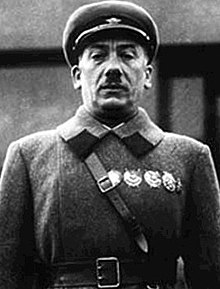Post by omega on Oct 25, 2020 13:57:00 GMT -5
Government Type
Military Junta
A military junta is a form of government in which the chiefs of the army control the state. After the revolution of 1926, and the subsequent execution of most of the royal family which did not manage to flee Orthoria by communist elements, save for Vladimir III, Mikhail Yagoda, then Commander-in-Chief of the Royal Army, declared a military junta headed by himself and his trusted allies in the Navy and Airforce. Since then, his policies only reinforced the military's standing up until the present, enabling Yagoda to declare himself Vozhd of the Orthorian State.

Next to Yagoda's monopoly on politics stands Lazar Lysenkovich, a prominent Orthorian post-Revolution Admiral who had undertook the herculean task of rehabilitating the Navy. After it was crippled severely, Lysenkovich used his position as head of the Judicial Branch of the Government to employ convict labourers to work at the numerous shipyards. However, after Yagoda began questioning the Admiral's loyalty to the regime, he ordered many of the shipyards dismantled to make way for new factories, though leaving the largest shipyard - Viktor Bey - intact.

As chief of the airforce and Minister of National Security, Oskar Sidorovich enjoyed quite a few personal liberties in Yagoda's government. Exalting himself during the 1928 Revolution, Oskar was appointed Minister of National Security in late 1929 as the government started attempting to consolidate its rule through the Storozhevoy Constitution, which plans to make Vladimir III's claim to the Orthorian throne illegitimate only on paper. Oskar, in the short time he has been Minister of National Security has cracked down on many protests and workers' strikes in the two years since the end of the Revolution.

Military Junta
A military junta is a form of government in which the chiefs of the army control the state. After the revolution of 1926, and the subsequent execution of most of the royal family which did not manage to flee Orthoria by communist elements, save for Vladimir III, Mikhail Yagoda, then Commander-in-Chief of the Royal Army, declared a military junta headed by himself and his trusted allies in the Navy and Airforce. Since then, his policies only reinforced the military's standing up until the present, enabling Yagoda to declare himself Vozhd of the Orthorian State.

Next to Yagoda's monopoly on politics stands Lazar Lysenkovich, a prominent Orthorian post-Revolution Admiral who had undertook the herculean task of rehabilitating the Navy. After it was crippled severely, Lysenkovich used his position as head of the Judicial Branch of the Government to employ convict labourers to work at the numerous shipyards. However, after Yagoda began questioning the Admiral's loyalty to the regime, he ordered many of the shipyards dismantled to make way for new factories, though leaving the largest shipyard - Viktor Bey - intact.

As chief of the airforce and Minister of National Security, Oskar Sidorovich enjoyed quite a few personal liberties in Yagoda's government. Exalting himself during the 1928 Revolution, Oskar was appointed Minister of National Security in late 1929 as the government started attempting to consolidate its rule through the Storozhevoy Constitution, which plans to make Vladimir III's claim to the Orthorian throne illegitimate only on paper. Oskar, in the short time he has been Minister of National Security has cracked down on many protests and workers' strikes in the two years since the end of the Revolution.

